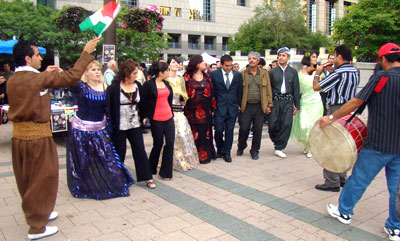A Kurdish organization tries to pass on its culture to youths in its community.
In the past his niece would never attend Kurdish events , says Khaled Majidi.
But today the vice chairman of Greater Toronto Kurdish House is proud to say the 15-year-old looks forward to them with excitement.
 It’s because she has learned at least six different types of dances, Majidi said.
It’s because she has learned at least six different types of dances, Majidi said.
“When we started Kurdish House four years ago, our main focus was on Kurds living in Canada. This was especially the case because we saw that the kids were slowly forgetting about their language and their heritage. We knew that it was essential to have a strong community centre,” he said. “I can see firsthand that this has made a change.”
In a multicultural city like Toronto, it is commonplace for immigrant youths to lose touch of their cultural background. The Kurdish community is no exception, which is why Kurdish House strives to preserve its culture by encouraging youths to stay connected to their roots.
Majidi said youngsters should appreciate the fact that Kurds have the freedom to create their own communities here, embracing their cultural values. The respective governments in the four countries in which Kurds are situated – Iran,
Iraq, Syria and Turkey – do not support human rights among them.
Some of the child participants don’t even know how to speak Kurdish but they are taking part in the activities Kurdish House arranges, Majidi said. Parents said it was once a hassle to take their children to any Kurdish events but now they’re eagerly awaiting the programs.
Arya Muhammad, 17, was among the teenagers at the festival. She said Kurdish House, created in May 2005, definitely helps in promoting the culture among Kurds who were either been born here or moved here at an early age but it is impossible to get all of them interested.
“This isn’t the case just with Kurds. Teenagers don’t always hang out at cultural events. It’s also time consuming to learn to read and write in your native language because you’re living here and you don’t feel like you need to know,” Muhammad said.
On Sep. 7, Kurdish House held its second annual Kurdish Heritage Festival in Mel Lastman Square. The event brought together Kurds from all four countries.
 Visitors listened to speeches, watched performances and took part in some dancing themselves; some dressed in Kurdish clothing.
Visitors listened to speeches, watched performances and took part in some dancing themselves; some dressed in Kurdish clothing.
Although it was only the second year the festival took place, Fereydoon Rahmani, the chairman of Kurdish House, said it is one of the ways they are attempting to bridge the gap between the younger and older generation. Between 1,000 and 3,000 people show up for the event each year.
Rahmani pointed out that Kurdish House has biweekly programs such as language classes, Kurdish dance classes, a basketball team and seminars on Kurdish issues and political trends.
“We have a Kurdish dance group for the kids and of course, everybody loves to dance. If they enjoy it, they will love to participate in it. They practised about twice a week for two months just for that 15-minute performance,” Majidi said, smiling.
It’s more than just teaching them the culture. The youth today must continue to fight for Kurdish independence and freedom in the four countries they are situated in, Majidi said.
“They need to be politically involved. What we are doing here is the first step. Getting them to come into the community and get involved in the activities will get them involved in more things.”
 Reza Moridi, a member of the provincial parliament for Richmond Hill, visits the festival each year and said, “The younger generations become unfamiliar with their culture but this kind of event gives them the opportunity to know where they come from, appreciate their culture and their background. It is the policy of the government that we celebrate diversity.”
Reza Moridi, a member of the provincial parliament for Richmond Hill, visits the festival each year and said, “The younger generations become unfamiliar with their culture but this kind of event gives them the opportunity to know where they come from, appreciate their culture and their background. It is the policy of the government that we celebrate diversity.”
By learning to value their culture even more, he said, they will in turn affect the politics back home.
Kovan Abkhar, 16, agreed that learning more about a culture impacts how much the younger generation gets involved but getting them to want learn in the first place is not so simple.
“I already have enough on my plate with school so it is hard to keep up by going to events or picking up a book and reading about the history. I do take pride in where I come from but it’s just hard to make time when you’re growing up here,” Abkhar confessed.
Since Kurdish House has been around for four years, it faces a few difficulties despite the fact it has gained attention in the Kurdish community.
“Up to now, most of the things that have been done in Kurdish House have been on the shoulders of maybe less than a dozen people financially,” Majidi admitted.
Only when the government recognizes there is a strong community presence will Kurdish House can receive the funds it needs, he said.
However, some groups within the Kurdish community sometimes feel threatened because they think they are going to be replaced by Kurdish House, Rahmani said.
“It’s not our job to lead the community. We want to participate in the community,” Rahmani said.
